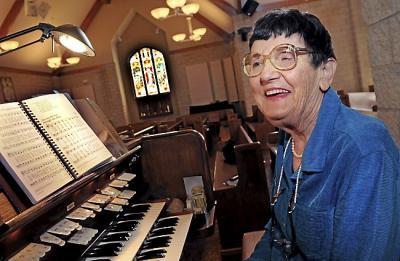No News From Doodlebug Island by William F. Jordan

Franklin Hempstead was a man who could have gone off to the hereafter loved and respected by other Doodlebug Islanders, missed by all who knew him, remembered for his quiet, sober reflections. But he almost ruined what could have been and should have been cherished recollections of his generous, giving nature by bequeathing his assets to the church of which he had been a member for sixty-five of his seventy-three years, and stipulating that the funds be spent in the acquisition of an organ, “unless the congregation should decide to expend the money on what they perceive a more pressing need.”
Now, an organ is considered by a relative few to be a sublime instrument, capable of trumpeting the somber requirements of grace, and awakening the spiritual aspects of one’s nature. But the greater majority of folks are of the opinion these beliefs are spurious in origin and downright dangerous if practiced. Organ ‘music,’ they conclude, (should it in any way approach the level of attainment implied by the word), is better fitted to driving pilings into river beds, canceling out the thunderous approach of summer storms, or masking volcanic explosions. They reason that any association with churches or occasions of religious piety is an attempt to awaken the dead whether they were in a “saved” condition or not when they left this world, and make them glad they won’t have to endure the dirge-like qualities of the instrument ever again!
Franklin himself would have gone to his grave holding the latter view except that his wife Marjorie arranged for them to travel to Venice, Milan, and other places of note where those citizens not already deafened by the crashing tones of this invention were yet so enamored of its powers they were willing to put up with the excesses of classical masters devoted to it. Out of consideration for his wife, he tried his best to share in her enthusiasm, and felt latent expressions of regret that he couldn’t. It was possibly this that urged him to change his will when she died two years after their return home and he, overcome with grief and momentarily unburdened of consideration for his fellow man, cast about for a suitable memorial and hit upon the idea of visiting an organ upon the unsuspecting people of Doodlebug Island.
Well, congregants debated the matter for the length of several days, and, over the objection of a small minority—but with the approbation of the larger community—voted to briefly table the matter while a compromise solution could be found. Hardly had they done so before the chairman of the Committee on Community Projects rose to her feet and announced that the scholarship fund for those Doodlebug students attending college was nearing depletion, and the two situations began to play in members’ minds. Could an institution of higher learning not be considered an organ, they wondered? After all, a university, with its emphasis on cultural awareness and intellectual stimulation could be so defined, could it not? It was a stretch, perhaps, but hadn’t Franklin himself allowed for some alteration in the ‘more pressing need’ clause? Indeed he had, they decided, and, with that, consigned the entire amount to the Community Projects committee for the purpose of funding scholarships and grants.
Naturally, there were those who took exception, but even they were ideologically divided. One or two had actually wanted to see an organ installed, and they felt cheated out of what they considered the possibility of pleasant listening. A couple more thought it would have enhanced the image of the church and aroused the envy of churches denied such an ornament. The rest were convinced that the terms of the will had been violated when funds were siphoned off for a project not specifically spelled out.
In the end, good sense prevailed; any number of students were privileged to matriculate or graduate college without the burden of a heavy debt, and the church itself was credited with compassionate understanding whose ecumenical overtones were regarded as exemplary. Members were singled out and applauded for their wise, selfless actions.
In the aftermath, Islanders began generalizing about the matter and found it to be conceivable, if not a completely gold-plated fact, that choirs willing to perform in the presence of pipe organs should be credited as being made up of brave, hardy souls, and that members of the Mormon Tabernacle Choir, in a symbolic gesture of commiseration, should be awarded medals for heroism.


